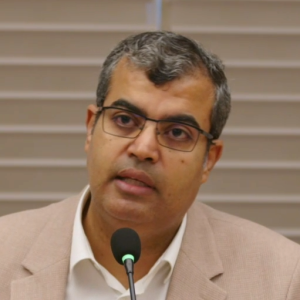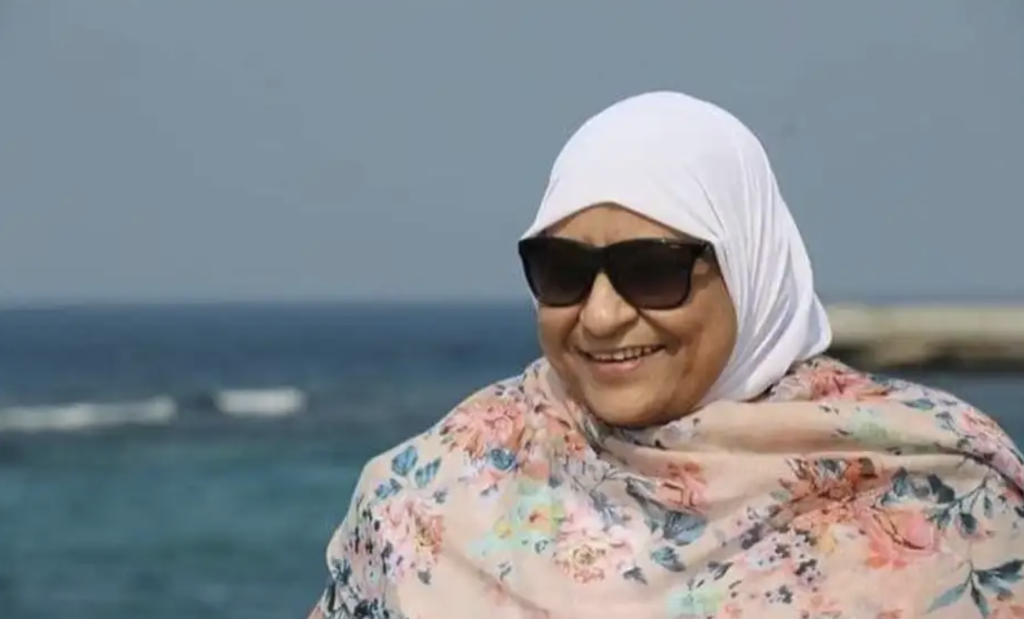Across the Middle East and North Africa (MENA), religious practices and ideologies have deep structural influence on governance and policymaking. Understanding the interaction of faith and politics is pivotal in understanding the complexities and challenges of democratization and political reform in the MENA region.
Mohammad Affan is an Advisory Group member of the Democracy Matters Initiative (DMI) at MEDC. He is an Egyptian researcher and an expert on Islam and politics, democratization, and transnational politics in the MENA region.
DMI’s Abdelrahman Ayyash recently sat down with Affan to discuss the role of religious ideologies in political governance in the MENA region. Affan examines how religious authorities legitimize political power, the impact of religious sectarianism on state policies, the challenges these pose to democratic transitions, and sheds light on the complex relationship between religion and state power and the implications for future political developments in the region.
MEDC: In what ways do current religious practices and ideologies influence governance and policymaking in MENA nations?
Mohammad Affan: In the Middle East and North Africa (MENA), religion has a significant influence on politics and is deeply intertwined with governance. In academic literature, the MENA region is often described as exceptionally religious. While I don’t fully agree with the idea of the exceptionality of the Middle East, religion enjoys a remarkable political significance in regional politics in different ways.
In countries like Morocco and Jordan, rulers derive legitimacy partly through their lineage to the Prophet Muhammad, peace be upon him. Similarly, titles such as “Custodian of the Two Holy Mosques” in Saudi Arabia and “Amir Al-Mu’minin” (the commander of the Faithful) in Morocco emphasize the religious roles of these leaders. Needless to say, the supreme leader of the Iranian republic is a religious scholar, who has unparalleled political powers, endowed to him by the Shiite theory of governance, “Wilayat al-Faqih” (the custodianship of Jurists).
Most MENA nations have constitutions that declare Islam as the state religion and use Sharia as a source of legislation, profoundly impacting policymaking and governance. This often leads to debates and polarization, especially around the role of Islamic law in modern governance. With the dominance of identity politics, Islamic parties and social movements are key players in the political scene, despite harsh measures deployed by autocratic governments aiming at their political exclusion.
Religious sectarianism is also a powerful force, as seen in Lebanon and Iraq’s confessional political systems and the Sunni-Shiite and intra-religious tensions across several countries like Bahrain, Yemen and Syria. These divisions often escalate into broader regional conflicts, influenced by religious identities. The sectarian divide is so deep that it has shaped regional politics for decades, as manifested in the ongoing proxies-mediated conflict between Iran and many Sunni countries in the Gulf region.
It’s also crucial to note that religious politics aren’t limited to Islam. In Lebanon, for instance, Christian political parties have been influencing governance throughout history. Additionally, Zionism, a religiously inspired ideology, is the founding doctrine of Israel, whose exclusive religious nature was further affirmed by the enactment of the ‘Nation-State Law’ in 2018, which affirmed the Jewish identity of the state.
What are the main obstacles that anti-democratic religious narratives present to achieving democratic governance? How do autocratic regimes use religious institutions and develop religious bodies to counter calls for democracy?
Let me start with this illuminating statement of Iranian-American professor of sociology Asef Bayat: “There is nothing intrinsic in Islam, and for that matter any other religion, which makes them inherently democratic or undemocratic.” To put it another way, religious narratives can be used or abused by both democratic forces and autocratic regimes to justify their positions, and those who manage to secure enough power will be able to promote their narratives and delegitimize the others’.
Autocratic regimes often exploit these narratives to maintain control and denounce democracy through religious justifications.
Three main arguments are worth mentioning here. First, democratic principles are dismissed in the MENA region by some as “Western” and not genuinely Islamic. However, historical reformist figures like Sheikh Rashid Rida have argued that the Western democratic ideal helped contemporary Muslims to realize the significance of the Islamic principle of Shura (consultation). In Rida’s discourse, democracy is no longer a foreign construct, but a practice related to the authentic Islamic principle of Shura, which has been reclaimed thanks to the interaction between Muslim and Western communities.
The second religious narrative often used to justify autocratic practices is that democracy, emphasizing people’s sovereignty, conflicts with the divine sovereignty central to Islam. This claim originates from the conflation between democracy as a philosophy with a secular tendency and democracy as a set of procedures that guarantees political inclusion, deliberation, accountability, and transparency. Yet, many Muslim scholars and thinkers like Tunisia’s Rached Ghannouchi advocate that democracy can exist within an Islamic framework, as it works in the framework of Christian values or socialist ideology. According to this perspective, the Muslim Ummah, not the Imam (leader) nor the Ulama (clerics), is the center of the Islamic political system.
The third anti-democratic narrative is the one upheld by the conservative voices in the Islamic spectrum. Official religious establishments, apolitical Sufi orders, and the quiescent Madkhali (a quietist school of thought characterized by loyalty to governments) faction within Salafism prioritize stability over reform, fearing that democracy might lead to chaos (fitnah). This perspective often leads to unquestioning loyalty to rulers, stifling democratic discourse.
Two main arguments are usually posed in this regard: The divisive impact of partisanship and the seditious potential of political opposition. The Prophet’s teachings, which urge unity of the Ummah and warn against division, are often used to discredit partisanship. Similarly, teachings that call for obedience to Imams, prohibit acts of rebellion, and condemn the doctrines of the Kharijites (the earliest civil war instigators in Islamic history) are abused to criminalize peaceful political opposition. Conversely, other Prophetic traditions that emphasize the duty of “commanding right and forbidding wrong,” and those that commend speaking the truth in front of tyrannical rulers, are frequently ignored or overlooked by these groups.
In response to these anti-democratic narratives, many contemporary Muslim scholars and intellectuals, such as Ghannouchi and the late Yusuf Al-Qaradawi, have emerged, highlighting the democratic principles inherent in Islamic governance theory. However, autocratic regimes leverage these anti-democratic narratives by controlling religious institutions. They manipulate religious education and appoint religious leaders who support their governance, thus maintaining a veneer of religious legitimacy while stifling democratic reform efforts.
Given the rise of Islamic movements after the Arab Spring, how do Egypt’s current political dynamics—particularly the prospects for democratization—support or hinder religious freedom and the protection of minority rights? Are there any emerging political or civil society movements that could drive democratic reforms while addressing these challenges?
Dealing with the problematic issue of religious and sectarian minorities in a region highly sensitive to its identity requires a multi-actor and multi-level approach. The reductionist answer of the post-independence Arab states of authoritatively imposing a unified secular national identity and suppressing religious and sectarian loyalties proved short-sighted and unsustainable. On the other hand, institutionalizing religious identities by establishing confessional political systems, built primarily on sectarian bases, led to the solidification of sub-national loyalties that fueled, rather than alleviated, sectarian tensions.
In Egypt, the obstacle to religious freedoms and minority rights is not only the illiberal ideology or the majoritarianism attitude of Islamic groups but also the regime’s manipulation of the minority card and its use of the Islamist scarecrow to justify its autocracy and its control and political abuse of the official religious establishments.
Therefore, the engagement of human rights advocates with these challenges should address multiple actors and deploy various approaches. First, political and intellectual efforts to deconstruct the exclusionary religious discourse are a necessary initial step. This requires engaging Islamist political actors, scholars and intellectuals in public discussions to challenge and reinterpret exclusionary narratives that marginalize minorities.
Second, the struggle for minority rights should be part of the struggle for an inclusive democratic system, not as an isolated endeavor, to avoid autocratic maneuvering. Providing limited and formalistic rights to the minorities in exchange for their support to the “protecting” authoritarian regime cannot achieve real and enduring progress in this file.
Third, advocating for the autonomy of religious institutions from state control to ensure their credibility and the genuine representation of their followers is a must. The political involvement of the religious establishments, such as Al-Azhar and the Coptic church, should be rationalized. Abusing religious fatwas to support the regime’s policies or abusing the church infrastructure for political mobilization could have serious long-term consequences on their legitimacy and credibility. Setting these institutions free from authoritarian control is essential to guarantee their autonomy and build a healthier relationship with the Egyptian state.
The Expert
Dr. Mohammad Affan is an Egyptian researcher and scholar. He is the director of Al Sharq Academia and a lecturer in the Political Science Department at Ibn Haldun University, Istanbul. Trained as a medical doctor, he earned his PhD from the Institute of Arab and Islamic Studies at the University of Exeter in 2020. Affan also obtained his MA degree in Comparative Politics from the American University in Cairo in 2015. His research interests include Islam and politics, democratization, and transnational politics in the MENA region.
The Author
Abdelrahman Ayyash is a policy consultant for the Democracy Matters Initiative at MEDC.


